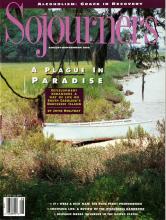My grandmother often reminds me that my late father's favorite band was Santana. It is one of her small ways of staying connected to both him and me. And while in this retro-rock world it isn't as rare as it once was for parents and children to enjoy the same music, it is unusual that the artist is still alive and well, producing music that is just as good as, if not better than, earlier works.
Santana's latest album Milagro (PolyGram Records, 1992) is funky, soothing, and spiritual. Through songs such as "Somewhere in Heaven," "Agua Que Va Caer," "Red Prophet," and "Free All the People (South Africa)," the music moves from rock to merengue to jazz and back again.
Though all of Santana's albums reveal the band's intimate relationship to the spiritual world and the struggle of the faithful to "keep on keeping on," Milagro ("miracle") uses more overtly Christian images than those of the past. Throughout the album, Carlos Santana invokes his own cloud of witnesses: Dr. Martin Luther King Jr., Bob Marley, John Coltrane, and Marvin Gaye; as well as recently departed friends Miles Davis and Bill Graham, to whose lives the album is dedicated.
"Latino psychedelic blues" is perhaps one way of describing Santana's music. Add "eclectic spirituality and justice-oriented" and the description becomes ridiculously incomprehensible. While true, such nomenclatures are required by the reductionary critics for whom every sound has its place. Pigeonholing has always been difficult in the world of rock and roll, and the globally influenced artists of the '90s, like Carlos Santana, really make such distinctions impossible.
Read the Full Article

